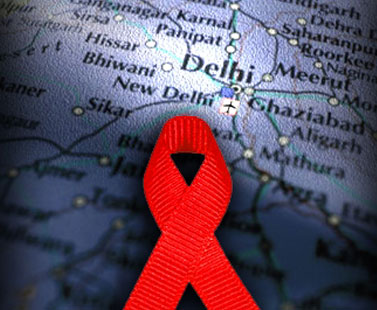
International AIDS symposium held in New Delhi
New Delhi: The 'International Symposium on Accelerating India's Response to Research for a Preventive HIV Vaccine', which was held in New Delhi this week saw a large number of parliamentarians, ministers and scientists deliberating on the achievements on AIDS research outcomes.
The main objective of the symposium was to devise ways to sustain the momentum that India has achieved as a center of excellence in HIV research.
The new science and technology minister, Mr Vayalar Ravi, opined that India is set to lead the discovery efforts given its foray in the research and manufacturing. He said that, "Scientists in India need to collaborate with the researchers across the world. It is the duty of political leaders, research agencies to step up efforts with each others help and support."
The symposium was hosted by the ministry of science and technology (S&T) in partnership with forum of parliamentarians for HIV/AIDS and ministry of health and family welfare. The event saw the presence of close to 300 attendees with unique blend of executive and legislative leadership with policymakers and key opinion leaders. Also present were civil society organizations and scientists from public and private sector institutions from India, who are working in the area of HIV vaccine research and also included 12 key global scientific experts.
Beacon of hope
Globally close to 30 AIDS vaccine clinical trials are ongoing, preominantly in early phases I and II stages. The HIV Vaccine Trials Network (HVTN) is currently testing one vaccine concept in a phase IIb efficacy trial, combining two vaccine candidates (DNA and adenovirus serotype 5-based). Results are expected in 2013. The International AIDS Vaccine Initiative (IAVI) and its partners are testing two new experimental vaccine combinations, results of whom are expected in the end of 2012.
In India, there are many key collaborative programs on HIV vaccine research in the field of biomedical tools such as microbicides, anti-retrovial therapy (ARTs) and vaccines supported by the government. Various key government agencies such as Department of Biotechnology (DBT), Department of Science and Technology (DST) and Council for Scientific and Industrial Research (CSIR), Department of Health Research (DHR), and Indian Council for Medical Research (ICMR) are spearheading joint efforts for vaccine development.
Providing support are the multilateral agencies like UNAIDS, USAID, and WHO among others, who play the role of being global mentors and funding sources. Among research institutes, newly formed Translational Health Sciences and Technology Institute (THSTI) is involved deeply in joint research efforts along with International AIDS Vaccine Initiative (IAVI).
Besides the domestic programme, India has been providing around 80 percent of global ARV drug demand. India, China and South Africa were applauded for their efforts to control HIV / AIDS at the last year's BRICS countries conference on health. Mr Gulam Nabi Azad, minister of health and family welfare, India, revealed that, "During the last decade in India, HIV infections have declined by 56 percent from 2.7 lakh in 2000-to-1.2 lakh in 2009 in our country."
Synergy and speeding up is the key
India is now beginning to extend the gains achieved from its global primacy in the area of vaccine manufacturing to its innovative work on other crucial aspects of vaccine R&D and beginning to indigenously do R&D on several novel vaccines that have either been commercialized or are nearing commercialization.
According to Margaret Mc Glynn, president & CEO, International AIDS Vaccine Initiative (IAVI), "Developing nations like India have to play more significant role in the vaccine development. So far few programmes like RV-144 vaccine candidate trials in Thailand where more that 15,000 healthy volunteers were involved, have shown good response. Now the focus must be on the commercialization. Momentum must be kept at a pace that is exemplary. Besides that 20 neutralizing antibodies have been identified."
Dr A P J Abdul Kalam, former president of India, believes that an autonomous organization engaged in creating synergy for the efforts funded by the government, can help in achieving more in less time. He suggested an apex body to review various programmes from time to time.
Policy makers at present are focusing on articulating a road map amongst policy makers, scientists, researchers, multilateral organizations and community experts on the multifaceted approach to HIV vaccine development. However, what is required on priority, is an environment that promotes sustained, well funded, innovative research to capitalize on new scientific insights.




